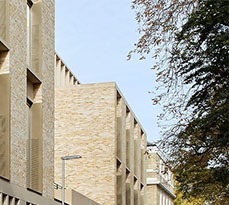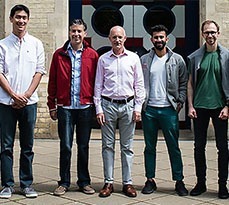
We have long known that the News & Insight section of the Cambridge Judge Business School website attracts an audience with eclectic interests and tastes, a reflection of the many different aspects of business explored at the Business School and our many different stakeholders.
As shown in the following list of the 10 most popular stories in 2018, readers in the last year were interested in subjects ranging from (figuratively) “blind” bosses to motivating workers to the ebb and flow of cryptocurrencies like Bitcoin. Also very popular was an article on the opening of our new Simon Sainsbury Centre building, which has been honoured with architectural awards, and a look back at members of our first Master of Finance (MFin) class of 2008.
And a lot of people wanted to know about the dangers of “bcc’ing” your boss (the short version: don’t do it!)
Here are our top 10 reads of 2018:
1. Blindingly obvious disconnection

23 April 2018
Powerful bosses can be ‘blind’ to gaps in workplace connections between employees, finds new study co-authored by Dr Jochen Menges at Cambridge Judge Business School.
Have you ever felt that your powerful boss fails to introduce you to useful co-workers in your company? Can’t they see the opportunities such helpful connections could bring to your firm? Are they that oblivious?
A study published in the Journal of Applied Psychology finds that feelings of power do “blind” people to the gaps that exist in workplace links: bosses in fact can’t see that some workers aren’t properly connected.
2. Beware of disincentives

10 January 2018
The ‘ratcheting’ up of bonus goals can make workforces less motivated, so managers need a clear system of communicating changes to incentives.
A research paper co-authored by Francisco Brahm, a PhD candidate at Cambridge Judge Business School, says that managers need to pay attention not only to the rules for incentive schemes but also on procedures used to update those schemes’ parameters – in order to build a long-term reputation for fairness among employees.
3. The new Simon Sainsbury Centre welcomes students and delegates

11 January 2018
The new £32 million Simon Sainsbury Centre opens at Cambridge Judge Business School, providing 5,000 square metres of new teaching, meeting and dining space.
Students and Executive Education delegates began arriving this month to the new Simon Sainsbury Centre building at Cambridge Judge Business School, a four-storey, 5,000-square-metre structure that greatly expands lecture, meeting and dining facilities while uniting the school’s activities under one roof.
The project, designed by Stirling Prize-winning architect Stanton Williams, sits on Tennis Court Road in Cambridge just behind Cambridge Judge’s iconic Addenbrooke’s building on Trumpington Street. The project was supported in part by a generous donation from the Monument Trust, whose founder Simon Sainsbury was also one of the Business School’s original benefactors.
4. Ten years on

13 June 2018
The Cambridge Judge Master of Finance (MFin) class of 2008: where are they now?
Celebrating 10 years of the Master of Finance (MFin) programme at Cambridge Judge Business School, which began in 2008 – right in the midst of the global financial crisis that has affected the banking system and the operation of financial markets around the world.
The first MFin class (MFin 2008) had 23 students, and the programme has since expanded to the current class of 59 students representing 29 different nationalities.
We caught up with some alumni of that first MFin class, who shared memories about their studies, life in Cambridge and how their career has changed since they first walked through the doors of Cambridge Judge back in 2008.
5. Avoid bcc’ing the boss

17 September 2018
People who bcc the supervisor in emails are seen as “less moral” and “less fit” to be team leader, finds study led by Cambridge Judge Business School researchers outlined in new Harvard Business Review article.
What’s an office worker to do if he or she needs to update the supervisor via email without alienating co-workers? Avoid bcc’ing the boss at all cost.
People in offices think colleagues who bcc a supervisor are “less moral” and “less fit to be the team leader”, but cc’ing the supervisor also carries its own baggage in reducing trust. A better bet is to rewrite the email as a separate “update” to the boss, concludes a series of studies led by Cambridge Judge Business School researchers outlined in a new article in Harvard Business Review.
6. Healthcare digital disruption

18 April 2018
Corporations should team up with more flexible startups to drive digital transformation of healthcare, says new paper stemming from collaboration between Cambridge Judge Business School, University Witten/Herdecke and Bayer AG in Germany.
Professor Stelios Kavadias, Margaret Thatcher Professor of Enterprise Studies in Innovation & Growth and Director of the Entrepreneurship Centre at Cambridge Judge, and corresponding author Hubert Truebel, who specialises in Cardiovascular Research at Bayer, jointly discuss some details in the paper’s findings.
8. Puncturing the headquarters myth

6 June 2018
Study by Cambridge Judge Business School’s Yasemin Kor and Niklas Lindlbauer finds that on-the-ground actors at dispersed business units, rather than corporate headquarters, often drive critical resource-allocation decisions.
One of the most critical tasks of any large company is the allocation of financial resources among its strategic business units: which segments to invest in, new markets to enter, firms to acquire, and divisions to sell off. Conventional wisdom assumes that corporate headquarters, due largely to “private information” not available to markets, drives such resource allocation with iron-clad control.
An ongoing research project at Cambridge Judge Business School paints a very different picture.
9. Second annual survey of global cryptoasset activity

6 June 2018
Findings by the Cambridge Centre for Alternative Finance describe the evolution of an industry that saw big growth in 2017.
The Cambridge Centre for Alternative Finance (CCAF), an academic research centre at Cambridge Judge Business School releases the second edition of the Global Cryptoasset Benchmarking Study.
The new findings reflect the growing maturity – and recent cooling off – of an industry that experienced huge growth in 2017. The aggregate market capitalisation of cryptoassets skyrocketed from $30 billion in April 2017 to more than $800 billion at its peak in early January 2018, until coming down again to hover at around $200 billion.
10. Beyond fixed price tags

17 January 2018
Buyers have a choice in what they pay owing to ‘participative pricing’ such as online auctions and pay-what-you-want music albums. A new study co-authored by Vincent Mak of Cambridge Judge provides an academic framework for this trend and suggests areas for future study.
“Participative pricing” such as online auctions and pay-what-you-want pricing of albums by independent musicians have become popular some 150 years after Philadelphia retailer John Wanamaker invented the price tag to discourage haggling. There has also been a rise in academic research into the practice over the past decade or so, with a focus on the marketing implications participative pricing has had on both buyers and sellers. A just-published journal article co-authored by Dr Vincent Mak, Reader in Marketing & Decision Sciences at Cambridge Judge Business School, provides a conceptual framework for the published academic literature on such pricing, and defines a framework for further study.

